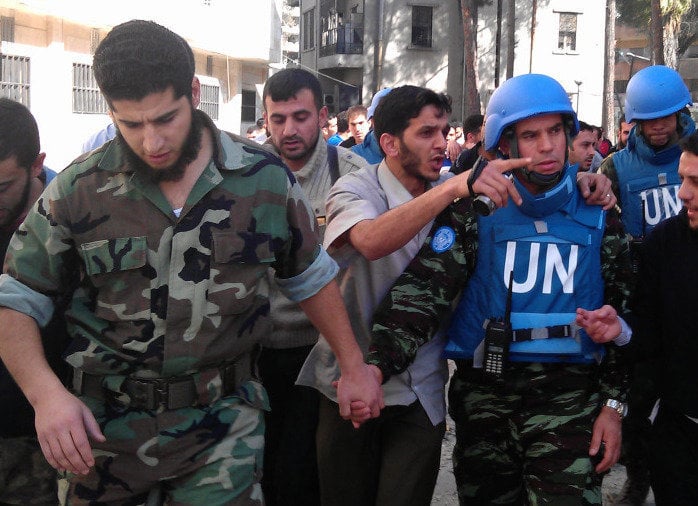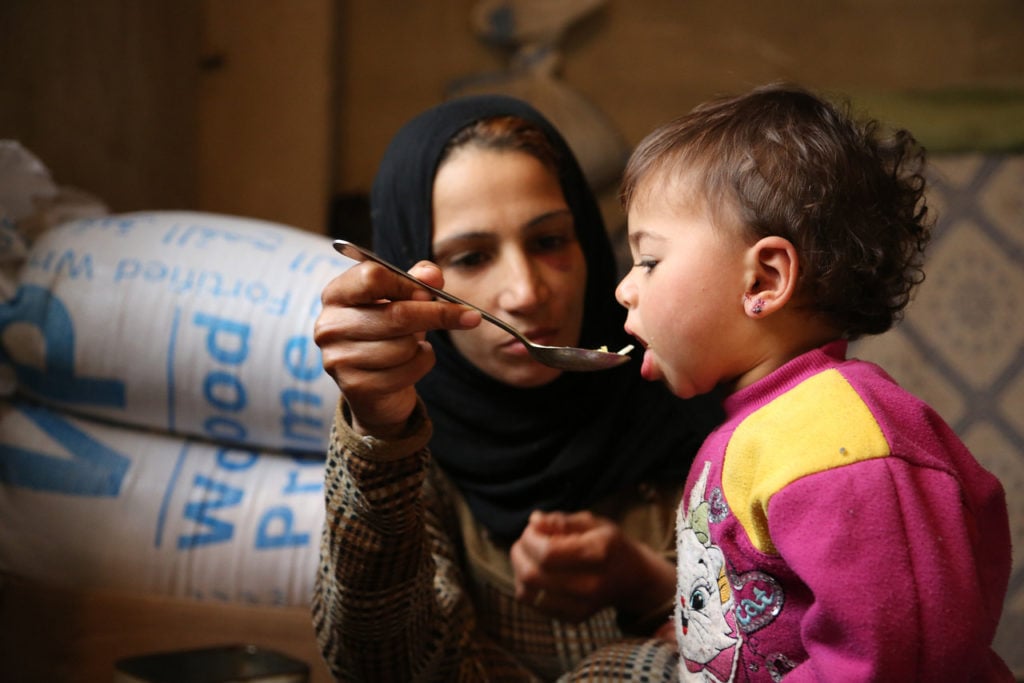
Syria’s President Bashar al-Assad has been careful to seize whatever advantage he can in his savage internal struggle with Syria’s fractious rebel groups. His regime has successfully held onto Syria’s most populated areas but lacks the legitimacy or the manpower to take back parts of the country which have slipped beyond the government’s control. Instead the regime has adopted the strategy of reducing rebel areas piecemeal, isolating pockets of resistance and besieging them until they change sides or surrender through starvation and attrition.
Reflecting the dictatorial nature of the Ba’athist regime, the Syrian government ultimately hopes to retake all the territory lost to it rather than negotiate a genuine power sharing agreement with any of Syria’s rebel groups. Though the Assad regime has long tried to control the narrative of the civil war inside and outside of Syria, its unwillingness to surrender any real power is the underlying reason driving a conflict in which it is responsible for the lion’s share of the death toll. Estimates of how many people this is now vary wildly but all agree it is in the hundreds of thousands.
The ongoing disaster in Syria has placed international aid organizations and governments in a dilemma. The country is currently the site of one of the biggest humanitarian crises of recent times. But at the same time the worst affected areas are often overrun by criminal gangs or extremist groups like Islamic State or Jabhat al-Nusra, and access to them is controlled by the Syrian regime.
Internationally, Damascus has been largely protected from facing the legal consequences of its serial serious violations of human rights by its ally Russia, which is suspicious of Western intentions. This has left aid agencies trying to address the consequences of the fighting in a country awash with armed factions, and where the authorities feel little pressure from the international community and control the conditions under which the agencies may operate.
There is evidence that the Syrian government has been exerting a great deal of influence on the actions of the UN aid agencies in Syria. It has leveraged foreign aid workers need for its permission to enter Syria into access to supplies for its supporters while denying vital food and medical aid to civilians trapped in areas outside its control. The UN now finds itself accused by a coalition of 55 Syrian opposition organizations, including the White Helmets group whose members act as emergency responders in rebel-held areas, of failing to push back against an authoritarian government intent on terrorizing the Syrian population back under its control.

Fatema, 24 years old, feeding her 18 month old daughter Haneen, Damascus, Syria. (WFP/Abeer Etefa)
On the ground, the regime has for years chosen to choke off the delivery of aid to rebel-held areas. Meanwhile the Syrian opposition claims 88% of the food aid sent to Syria was distributed to government supporters, giving the regime a powerful tool of patronage. Critics say allowing the regime to decide where food deliveries go is making international aid agencies complicit in government atrocities by following a policy that implicitly favors the stronger government side in the conflict. Civilian casualties in the besieged areas have been steep while the Syrian government has faced no sanctions for denying aid organizations access to territories not under its control.
In fairness the recent criticism has caused the UN and its humanitarian partners to look at their work to date, while Syrian civil war remains one of the largest and most complex humanitarian disasters in decades. But aid agencies have clearly felt unable to jeopardize their work in Syria by standing up to the Assad regime and it is not clear how they would be able to do so without substantial outside pressure on Damascus.
Such a unified international response has not been forthcoming because of the split priorities the rest of the world has in dealing with the ‘bad actors’ in Syria. To divert attention from its own brutality, the regime has portrayed itself as the only bulwark against Syria becoming a failed state overrun by Islamic militants from either al-Qaeda’s local franchise or IS, which has claimed responsibility for a string of international terrorist attacks this year.
In response, Syria’s opposition has called for UN agencies operating in Syria to publicly lay out conditions for continued cooperation with Damascus and sever work with the government if they are not met. This is a risky strategy for the rebels as Assad could reject any conditions and blame the opposition and the international community for the subsequent collapse in food and medical supplies. On the other hand Damascus has used aid to keep up the morale of communities loyal to it and as a bargaining chip to entice rebels into prisoner swaps and surrendering territory.
Kicking out the aid agencies now would narrow these options and raise costs at a time many of the regime’s supporters are lukewarm towards it at best. Meanwhile the international community could switch to food drops which bypass the regime and perhaps the areas it patronizes. A decline in international aid could generate yet more criminal disorder and political dissent in the regime’s territory, which has by now been reduced to the core areas of Syria.
With nowhere left to go if these start to slip away from him, Assad may prefer to negotiate terms rather than risking accepting sole responsibility for the disaster he has helped create. The UN should continue pushing harder to get a better aid deal for Syria’s battered people from their President.